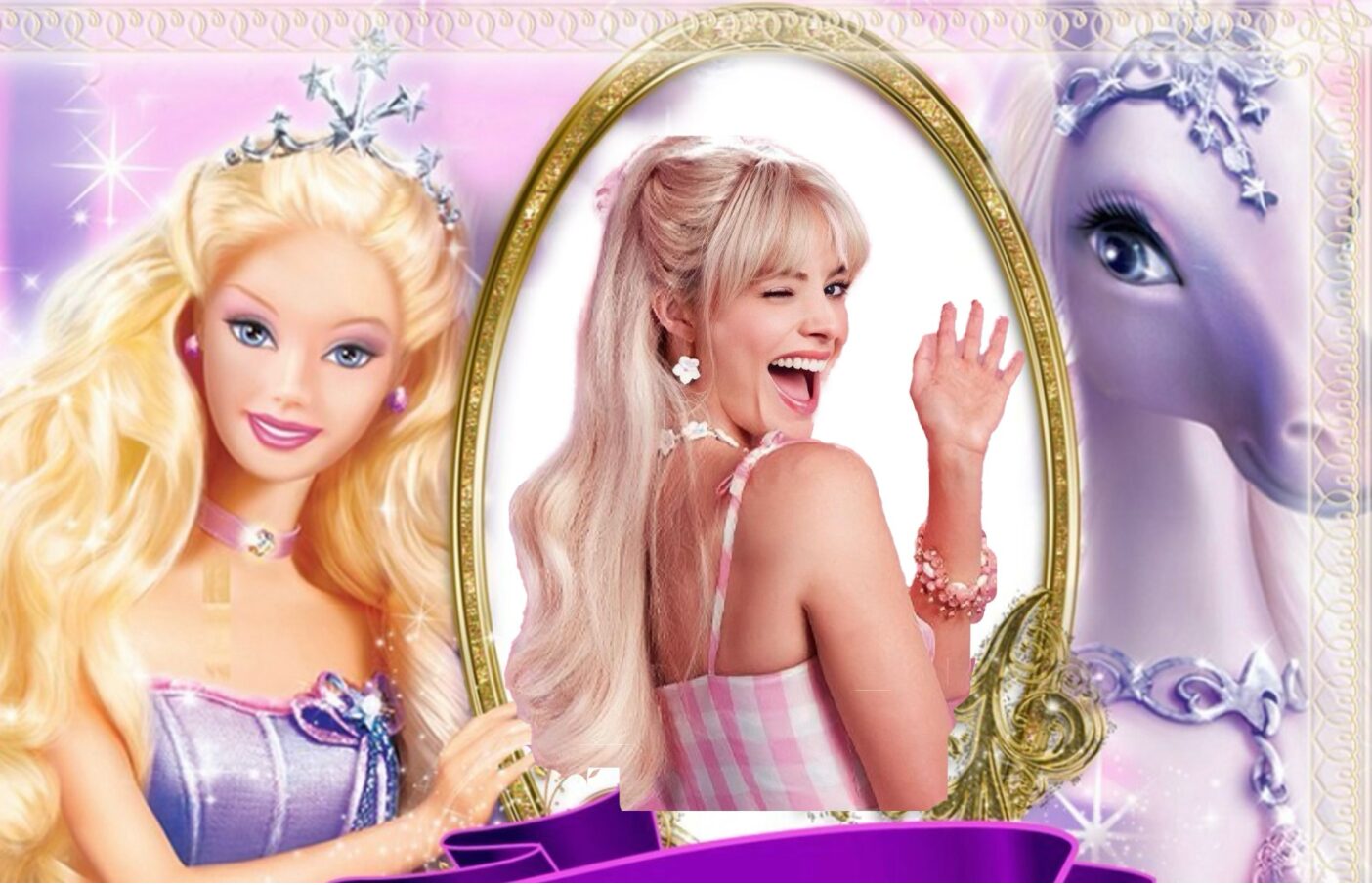By Camila Perez ’26
Author’s Note: This piece contains spoilers. But to be fair, this movie has been out for a couple of months… so if you have not watched it at this point, can you really be mad at me right now?
My best friend Noe and I rush down Temple Street, our arms interlocking as we squeeze our way through herds of fellow movie-goers dressed in bright pinks and glitter. I wore my hair in a ponytail that pulled tightly on the sides of my forehead, and white platform sandals that I had definitely outgrown since the last time I had worn them.
The heels of my feet grew plump and red. With the hot New Haven sun beaming into my eyes, I grab onto Noe’s shoulder with one hand as the other holds firmly onto the back of my limping foot. Turning towards my friend, I joke about our styling choices for the day and the irony of tolerating pain for the sake of beauty, despite the unlikelihood that anyone would actually care about what we were wearing.
Inside the dimly lit theater, Noe and I settle into our seats, sinking into plush chairs that offered a welcome reprieve from the unforgiving pavement. As the movie unfolds, we find ourselves exchanging amused glances at each absurd joke made by one of the Kens. At other times, moments of reflective quietude filled the theater, as a teary-eyed character would speak on the familiar warmth of feminine love, or contrastingly, the excruciating pain of it all.
At the culmination of the film, Gloria delivers a monologue that inspects the intricacies of womanhood, particularly exploring how its relationship with society relegates women to a position of perpetual state servitude. Gloria’s critique not only encompasses servitude in the physical sense, with the Barbies tending to their Kens by giving them beers and rubbing their backs while dressed in their maid outfits, but also a psychological confinement of always having to be more than what they are.
What is particularly eerie about the unrealistic expectations that Gloria brings to the center of discussion is that the Barbies already have it all. They were quite literally sculpted to mirror the image of physical perfection. And not only are they conventionally beautiful, but they are doctors, astronauts, scientists, and leaders. They are made to embody exceptional talent in every sense of the word. Yet, we find Stereotypical Barbie at her lowest moment in the film weeping about what she is not, haunted by the same curse that plagues the lives of everyday women as she discovers that what she has to offer is not enough for her. And as Gloria passionately points out, never has it been enough.
Gerwig’s development of this storyline is what makes the end of Barbie so meaningful. In the final scene of the film, Barbie decides to leave behind the world of Barbie Land and is reunited with Gloria and Sasha, who are now dropping her off at what first seems to be a job interview. However, as she approaches the reception desk, Barbie declares, “I’m here to see my gynecologist,” with a wide smile on her face.
Gerwig underscores the simplicity of Barbie’s newfound identity. She no longer has to be a superstar or a doctor; she doesn’t even have to work, and she doesn’t even have to be Barbie! In relinquishing the idyllic life she once knew, Barbie recognizes the profound beauty in the ordinary, in simply being, and the richness of everyday womanhood. Gerwig asserts that merely by her own existence, the everyday woman redefines the very essence of what it means to be a woman in today’s world, rendering her an unsung revolutionary.
Now, would I say that Barbie provides an adequate examination of gender roles and empowerment? No. And I would even go as far to say that by neglecting to engage with other significant dimensions of diversity in womanhood, this film falls severely short in addressing many of the aspects that it is almost obliged to.
As is typical with movies of this formula, Barbie inevitably finds her way to a happy ending. Yet, one cannot help but wonder how differently this narrative would have unfolded if the movie did not adhere to the convention of whiteness as it so painfully does. The truth is, this idea does not require much imagination. For many Black and Brown women, finding solace in the unremarkable often remains elusive in a world that does not already acknowledge our exceptional character. Are we going to pretend that Barbie’s happy ending is obtainable for these girls, too?
What is most deeply unsettling about Barbie is that there is ultimately no reconciliation for the damage incurred to Black and Brown women. There is no genuine apology on behalf of Mattel for historically omitting marginalized women in their idealized conceptions of womanhood with the creation of Barbie (the doll). Instead, Barbie (the movie) gives us cheap jokes at the expense of the Mattel Executives and a “women actually do not have to be anything!” message that is not only detached from reality, but verges on outright mockery.
With all of this considered, would I agree with American film director Kelly Reichardt that this movie is “diluting cinema as an art form?” Definitely not.
Though I am disappointed by the exclusionary nature of Barbie, I do have to admit that I did not come to watch Barbie expecting a thorough, indie-film-esque dissection of the difficulties and triumphs inherent to the feminine experience. That would be uncharacteristic for a movie of this caliber whose primary goal is not just to explore niche avenues of expression, but to conform to commercial appeal. Still, the movie’s supposed lack of depth does not mean there is nothing to take away from it.
Rather, the beauty of the movie lies in its simplicity and in its ability to employ this feature in order to forge an intimate relationship between itself and its viewer. More specifically, by eliciting this feeling of mediocrity from the audience, Greta Gerwig is able to hold a mirror up to the audience that allows them to become integrated into the film’s critique.
She compels the audience to reflect on our unquenchable desires for more: more from ourselves, more from Barbie, and more from women. Gerwig insinuates that perhaps we will never be able to embrace the freedom in simplicity until we look into ourselves and find peace with its ugly sister: mediocrity.
My argument is not to excuse the movie’s shortcomings, but I do believe there is a need to highlight a new appreciation for the reciprocal critique that the movie’s minimalistic narrative leaves space for. In other words, Barbie’s artistry is captured not by the complexity nor the thoroughness of its storytelling, but because it bites back.



